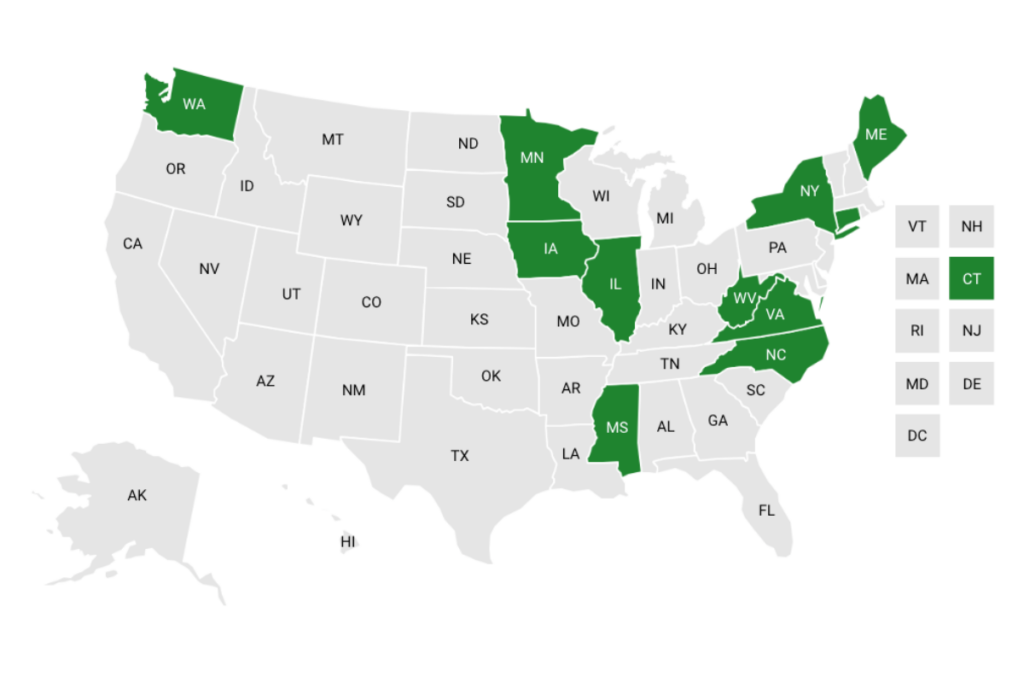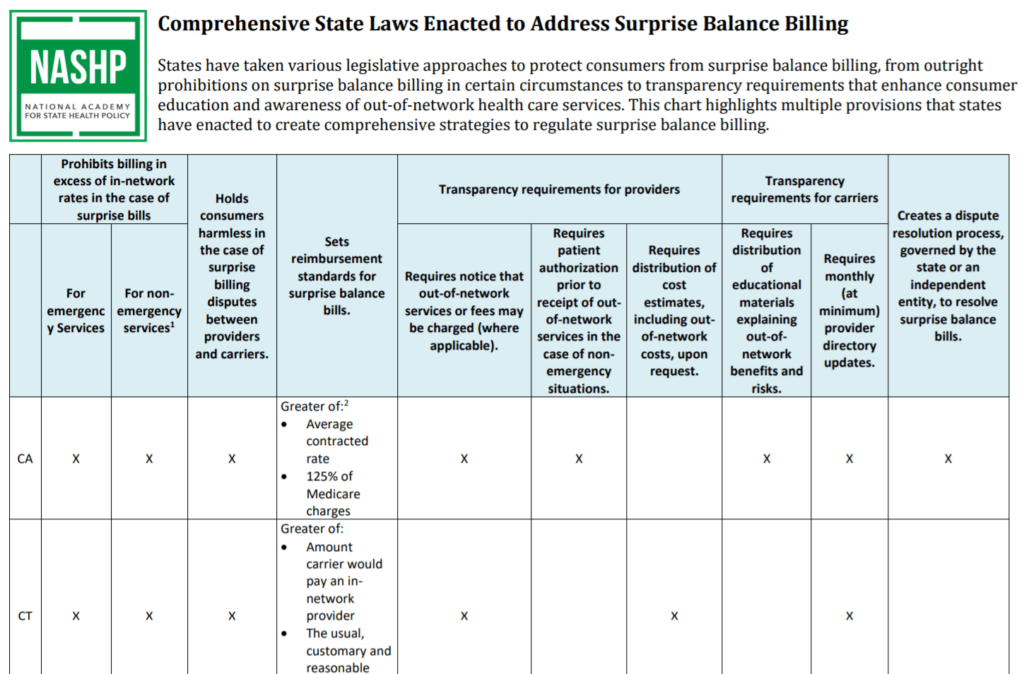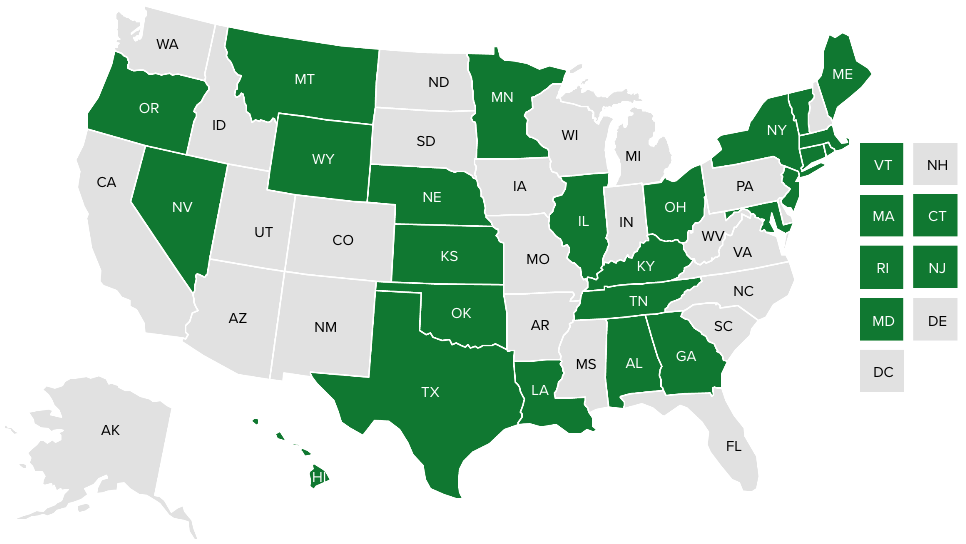This information was collected through a combination of state surveys and NASHP staff research. It offers a snapshot of how the state is defining, training, certifying, and paying for the CHW workforce — as well as how the state is developing cross-agency and state-to-local strategies to improve community health in partnership with CHWs.
This is a dynamic policy space, and states are continuing to develop new approaches. We will continue to make periodic updates to this page. Learn more about state CHW policies across the U.S.
State CHW Definition
The Louisiana Department of Health website defines a CHW as “a trusted member of, and/or has an unusually close understanding, of the community served and resources available, … assists individuals in addressing social problems that lead to poor health with increased attention on food insecurity, housing, transportation, utilities assistance, furthering education, mental health connections and education related to chronic conditions.”
Certification and Training
In 2019, the Louisiana Legislature created a CHW workforce study committee to make recommendations about how best to support the CHW workforce. The study recommendations included opting not to develop certification, but rather standardized training for CHWs. The CHW Workforce Study Committee has evolved into the Louisiana CHW Workforce Coalition, which created criteria and a review process for CHW training programs in the state.
The Louisiana CHW Institute and Louisiana Community Health Outreach Network (LACHON) provide CHW training, as well as training for supervisors and public education about the roles of CHWs.
Medicaid Reimbursement
Louisiana Medicaid reimburses for CHW services under its State Plan as a professional service billed “incident to” the supervising physician, advanced practice registered nurse, or physician assistant. Billing code information is below, and the Professional Services Provider Manual offers additional information.
- CPT codes 9896x (self-management education and training, 30-minute units)
- Federally qualified health centers use HCPCS codes T1015, H2020, or D0999 plus an E&M code
MCOs may also reimburse CHW services through their own contracts with CHWs in addition to the state plan requirement. Louisiana also pays for CHW services through some alternative payment models and value-based payment models.
Other Funding or Financing Mechanisms
Louisiana Department of Health is funding the Community Health Ways Program through funding from the CDC Community Health Workers for COVID Response and Resilient Communities (CCR) initiative.
Key Partnerships
The Louisiana CHW Institute at Louisiana State University (LSU), LACHON, and the Louisiana CHW Workforce Coalition are key partners, including in the development of Medicaid financing strategy for some CHW services. The Louisiana CHW Workforce Coalition is co-led by the state CHW association (LACHON) and the Louisiana CHW Institute at the LSU Center for Healthcare Value and Equity. Additional members include the Louisiana Office of Public Health, Louisiana Managed Medicaid Associations, community-based organizations, Louisiana Primary Care Association, and health systems. There is an effort to ensure that half of members are CHWs in keeping with APHA and NACHW policy.
State CHW Legislation
HB 587 was signed by the governor in 2023 and establishes the Louisiana Community Health Worker Workforce Board within the Louisiana Department of Health.
State Resources
State Overviews
ACO – Accountable care organization
AHEC – Area Health Education Centers
APHA – American Public Health Association
APM – Alternative payment model
CBO – Community-based organization
CDC – Centers for Disease Control and Prevention
CDC CCR Funding – Community Health Workers for COVID Response and Resilient Communities Funding
CHR – Community health representative
CHW – Community health worker
CPT Codes – Current Procedural Terminology Codes
C3 Project – CHW Core Competency Project
FFS – Fee for services
HCSPCS Codes – Healthcare Common Procedure Coding System Codes
HRSA – Health Resources & Services Administration
MCO – Managed care organization
NACHW – National Association of Community Health Workers
SDOH – Social determinants of health
VBP – Value-based payment
State CHW Definition: This category indicates where states have a formal definition of a CHW. In some cases, where there is not a definition in statute, this category may draw information from provider manuals and state websites or reports.
Certification and Training: This category includes information about how CHWs are trained in the state, which entities provide training, whether or not the state runs or recognizes a CHW certification program, and information about the entities that administer existing certification programs.
Medicaid Reimbursement: This category includes information about state Medicaid strategies that provide enrollees access to CHW services. Entries indicate whether state Medicaid programs currently reimburse for CHW services or incorporate CHWs into alternative payment models under the authority of a state plan amendment (SPA), or where states have earmarked funds to support CHW services under the authority of an 1115 demonstration waiver. It also indicates where CHW services might be supported through managed care approaches (e.g., where MCOs are paying for CHW services using administrative dollars or where states are using managed care contracts to incentivize or require MCOs to cover CHW services).
Other Funding or Financing Mechanisms: This category includes information about other state funding or financing approaches that cover CHW services or CHW positions. It includes information about federal grant dollars for which the state is the grantee.
Key Partnerships: This category offers information about key partners outside state government, including state CHW associations and CHW training entities, and highlights formal cross-agency partnerships within the state that support alignment of funding and resources for the CHW workforce.
State CHW Legislation: This category highlights any state legislation relevant to the CHW workforce. This might include statutory language directing agencies to develop a Medicaid reimbursement approach, laws that established state CHW certification, or other relevant statutes.
State Resources: This category offers links to any key reports or resources that states elected to highlight as critical to CHW policy and partnership.



